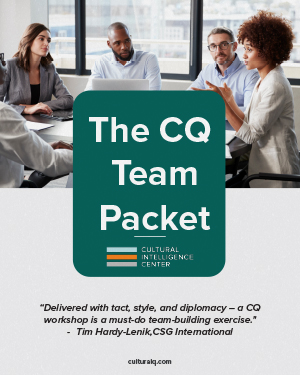Every day we get reminders about life in our borderless world…
- GE made $14.2 billion in profits in 2010 yet they owed no U.S. corporate taxes because most of their activity was abroad.
- The Hispanic population in the U.S. just hit 51 million, more than the population of Spain.
- And last year, 67% of commercial flights were operated by Middle Eastern and Asian airlines as compared to 29% by North American and European air carriers.
Success in today’s world is directly connected to your ability to work effectively in a variety of different cultures. But a lot of the conventional wisdom about cross-cultural effectiveness is based upon myth and anecdote.
The research on cultural intelligence or CQ is rooted in the work of academics scattered across the globe. And it points to many promising discoveries for working across borders, whether they be national, ethnic, or even organizational or generational borders.
When introducing people to the findings from CQ research, here are three places to get started in talking about cross-border effectiveness:
1. Don’t Trust your Gut
Great executives often talk about leading from the gut. Some of the research on social and emotional intelligence has supported the advantage of having good instincts for leaders when they need to gauge the climate of their organization or read the intentions of a potential client. But this instinctive ability is born out of extensive experience-something that won’t necessarily apply when interacting with a business or individual from a different cultural background than one’s own. As much as we might like to think that our gut instincts will help us get by anywhere, research suggests otherwise. Working across borders does not accord with our intuition. People with cultural intelligence deliberately test their intuitions.
2. It’s a Bottom Line Issue
Sometimes capabilities like emotional and cultural intelligence get written off as soft skills with limited tangible benefit for the bottom line. But the research finds a number of consistent pay-offs for leaders and organizations that prioritize the development of cultural intelligence. The most consistent results you can expect from having higher CQ are: Superior cross-cultural adjustment, improved job performance, enhanced personal well-being, and greater cost-savings and profitability. Cultural intelligence and diversity initiatives shouldn’t just be delegated to the HR office. The organizations that are most successful working across a variety of cultural contexts take a more integrated approach because of the direct connection between CQ and the bottom line.
3. Anyone Can Be Culturally Intelligent
Your CQ has very little to do with where you grew up, how much you’ve traveled, and how smart you are. It’s a capability anyone can develop and while your CQ is most evident through your behavior, increasing your CQ is more related to developing internal skills—e.g. internal motivation, consciousness, and decision-making abilities. Of course hands-on experiences cross-culturally are a key way of developing your CQ but it’s not a foregone conclusion that just because someone has lived or worked overseas that he or she has high CQ. Sometimes an individual’s international experience keeps them very isolated in an expat community or without CQ, the experience may actually reinforce inaccurate stereotypes.
To improve the way you work in our rapidly globalizing world, take a CQ assessment and use the feedback to create a personal development plan that builds upon your CQ strengths and allows you to focus upon the areas where you need the most work.
Originally written for CNBC
